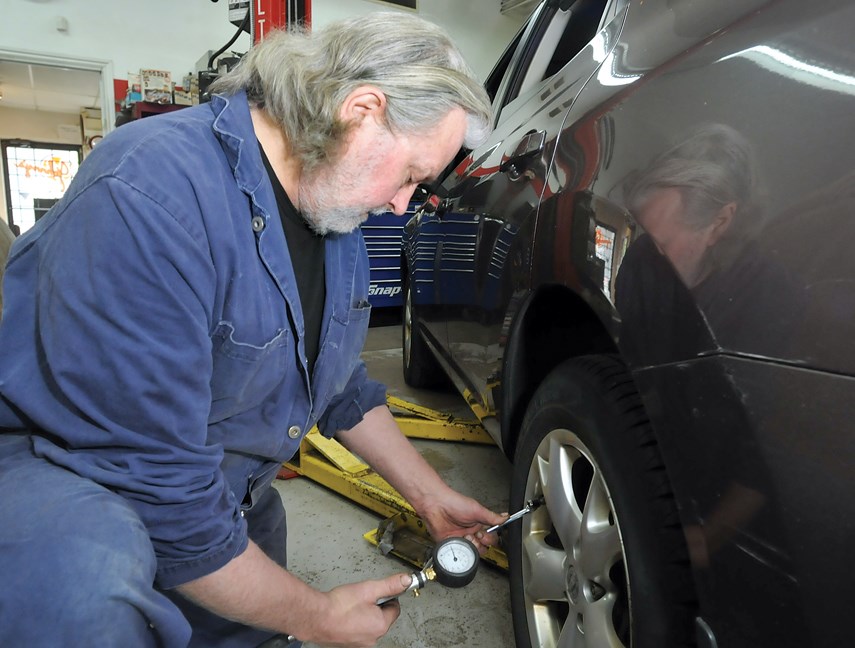Summer officially starts this week, which means the summer road trip season won’t be far behind.
We checked in with Kory Aylward, co-owner/operator at Johnny’s Automotive in North Vancouver for some tips to get drivers ready for summer travelling.
North Shore News: What are some of the systems a driver should check to make sure their car is ready to travel?
Kory Aylward: With today’s vehicles it can be difficult for the operator to find things under the hood with covers/protectors obscuring any visual inspection. Inspecting lights, signals, fluids, tires, tire pressure, air conditioning, heating, belts, hoses, safety harnesses, loose shrouds, torn boots, worn steering components, brakes, battery. Checking if fans are working. The list is long.
North Shore News: What are some parts of the car that a driver may be able check and repair on their own?
Kory Aylward: It is a good idea to read your owner’s manual for instructions on how and what to check before embarking on a road trip. Inspecting windshield wipers for tears, nicks, cracking. Checking oil levels, windshield fluid/bugwash, windshield spray nozzles, tire/tread wear, tire pressure, transmission oil (while running) lights/bulbs, signals, battery, oil/filter, air filter, cabin filter. Carefully check overflow bottle levels and anti-freeze quality. Read the manual to safely check fluids, etc.
North Shore News: What are some summer maintenance and repairs that a driver should not try to do on their own?
Kory Aylward: I would advise an air conditioning service, especially if it hasn’t been used during winter months. A professional technician can examine steering and drive train components, and exhaust systems with an experienced eye. Really for peace of mind a pre-trip inspection is a good thing to have before any lengthy driving.
Some general don’ts:
Don’t open the radiator cap if it is hot or even warm.
Don’t check transmission fluid without emergency brake on when car is running (actually all kinds of things can go wrong here, look ... where are the kids?).
Don’t pull off hoses or tug at wiring.
Don’t fill fluids with just any type of fluids, use recommended brands with proper SEC standards, viscosity or thickness. Don’t fill tires without a proper PSI gauge. No guessing.
North Shore News: In general, what type of wear-and-tear can a driver expect or should be aware of, on a car if travelling great distances?
Kory Aylward: Long, continuous, high-speed driving will cause failure of already compromised components or parts. Fresh fluids will minimize wear and tear. Tire wear obviously, windshield nicks from rocks, air filters clog up, general use and mileage can cause wear on all moving parts. If travelling more than 3,000-5,000 thousand kilometres getting an oil change and lube would be beneficial during the trip.
North Shore News: Do more engines overheat in the summer? What should drivers do if they notice steam coming out and think their car is overheating?
Kory Aylward: Oh, yes! Overheating is summer! If you notice steam or an excessively high temperature gauge pull over immediately and call for help. Do not open the radiator cap. Do not pour cold water in or on anywhere. Do not try to make it to the next exit/shop/restaurant/town. Call a tow truck.
North Shore News: What are some concerns about being stuck in summer traffic for long periods of time?
Kory Aylward: Overheating can occur while stuck in traffic. Turn off the A/C, turn on the heater to cool the engine down. Watch the gauges or warning lights. Keep fuel topped up. Don’t rest your foot on the brake. Keep supplies of water and snacks, maybe a honey pot/toilet paper for the kids(or yourself).
North Shore News: In general, how does summer (and hot roads) affect tires?
Kory Aylward: Obviously you will have better traction with warm rubber. Tires will wear faster and have higher pressure with heat. Old and worn tires may have cords separate or blow.
North Shore News: A lot of summer road trip travel includes getting caught in congestion. Do you have any tips and/or concerns about stop-and-go traffic?
Kory Aylward: Check with DriveBC website for closures and clogged roads, try to avoid using them. Keep an eye on the temperature gauge or light/ any warning signals for overheating or a draw on the charging system. Use a lower gear and try to avoid heating up the brakes.
Having highway tires or a low-to-the-ground car is not conducive to off-track driving. Smooth tires and sharp rocks don’t go together well. Gravel is not friendly to paint or body work. Twigs and bushes scratch paint.
Dirt and dust gets everywhere. But hey, clean smooth highway driving can be boring and monotonous. Breaking down in the bush is always an adventure, like walking out listening to the coyotes howl.
North Shore News: Anything you would like to add?
Kory Aylward: I find a lot of people don’t realize that air conditioning systems need to be maintained as well. There is oil that needs to be changed too. Also using the air conditioning during the off season helps.



